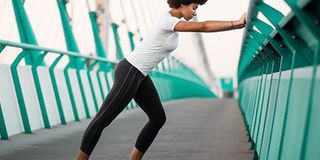The best care for your workout gear

Synthetic materials come in handy because they pull the sweat away from the skin and out of the clothing. NET photo
What you need to know:
A lot of active wear today is made of technical fabrics that wick moisture away from the body so you can stay cool while you work out. These materials require special care to get them clean and ensure they last for many more workouts.
It is frustrating when that funky smell lingers in gym clothes even after they have been washed and dried. Apparently, the smell means that the clothes still harbor some form of bacteria, sweat and body oils. Gym clothes are difficult to wash because the really good ones are made of synthetic fabrics.
“Gym clothes are made of synthetic fabrics that absorb the body’s moisture in order to dry fast. These fabrics also easily absorb oil, sweat and bacteria and have a tendency to hold on to them,” Yuetching Yuan, a sports goods store owner reveals.
Unlike cotton, which soaks up water, synthetic fabrics repel water. As heat from your body pushes sweat away from your skin, the liquid spreads out over the surface of the synthetic fibres, enabling it to evaporate quickly and leaving the garment light and breathable.
A special detergent is needed to be able to penetrate these synthetic fabrics in order to get rid of all that bacteria, sweat and body oil get trapped inside the fibres.
“There are detergents specifically formulated for performance fabrics. If you cannot find it, get one that it is intended for synthetic fabrics,” Yuan advises.
Abrahuman Sulaiman aka coach Nash who as a gym manager has his share of experiences with stinky workout wear, says he has devised a system that keeps the problem at bay. “I make sure everything is washed at the end of the day’s workout sessions. And instead of piling it in a corner or a laundry basket, we hang them on a wire to air them out,” says coach Nash.
Washing
Coach Nash says he uses regular detergent to wash the clothes but supplements it with baking soda and white vinegar to fight the odour. He recommends turning the clothes inside out when washing so that the sweat, oils, and other substances that the body expels during exercise are exposed to the detergent. There is temptation to use hot water which seems more effective but it can cause shrinkage and decrease the performance of the fabrics.
Coach Nash also cautions against using too much detergent to get the sweat smell out, but rather use the normal amount because it might be difficult to rinse out all extra detergent and will be left clinging to the fibres of your workout clothes.
While we love the fresh scent of fabric softener, workout clothes and fabric softener are an unfortunate pair. Fabric softener breaks down the elasticity in stretchy fabrics such as nylon and spandex.
It also creates a barrier on the garment, which traps in odours and clogs the pores of technical fabrics, decreasing their moisture-wicking capabilities.
Taking care of gym shoes
To look after your gym shoes, put them in the freezer to kill the bacteria, as they cannot endure cold temperatures. If the freezer trick does not work, put in a healthy dose of baking soda and let the powder absorb the odour overnight. Place fresh orange, grapefruit, lemon, or lime peels into the shoes. Fresh citrus peels have a great smell because of essential oils. Leave the peels in your shoes overnight and remove before using.
Dry
Bacteria and microorganisms thrive in damp conditions. So, keep your shoes dry, for example, by stuffing them with old newspapers after a run.
Neutralise
Because the smell in your shoes comes from isovaleric acid, you can neutralize it with an alkaline compound like baking soda. Sprinkle half to a whole tablespoon of plain baking soda into each shoe and leave them overnight.
Source: womensrunning.com




